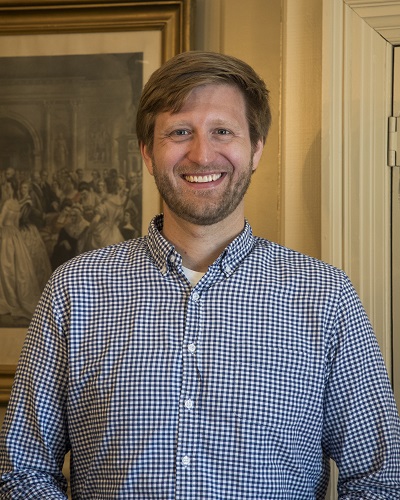Cam Terwilliger
- Hodson Trust-John Carter Brown Library Fellow, 2017-18

2017–2018 Hodson Trust-John Carter Brown Fellow Cam Terwilliger is a Brooklyn-based
writer whose work has been published by literary magazines such as Narrative, American
Short Fiction, Gettysburg Review, Post Road, and elsewhere. He holds an MFA from Emerson
College and his work has been supported by fellowships, scholarships, and awards from
the Fulbright Program, James Jones First Novel Fellowship, Virginia Center for the
Creative Arts, Massachusetts Cultural Council, Historical Novel Society, and the Bread
Loaf, Tin House, and Sewanee Writers' Conferences. In 2015–2016, Cam served as the
Reginald S. Tickner Fellow, a writer-in-residence position at the Gilman School in
Baltimore. Currently, he teaches creative writing at Seton Hall University and serves
as Associate Fiction Editor for Bucknell University's literary magazine, West Branch.
While in residence as the Hodson-Brown Fellow, Cam worked on his historical novel,
Yet Wilderness Grew in My Heart, a book set in New York and Québec during the French
and Indian War (1754–1763). The plot centers on Andrew Whitlaw, a Manhattan physician
who—after an ongoing struggle with syphilis—must relocate to his older brother's estate
in the Hudson Valley to recover. From this starting point, the plot follows the narrator
as he grows embroiled in his brother's obsessive pursuit of a counterfeiter—a former
slave operating on nearby Mohawk Native American land, a man costing their family
trading business dearly with his false bills. By working in the genre of historical
fiction, Cam aims to reimagine foundational novels of colonization such as Cooper's
The Last of the Mohicans from a postcolonial perspective. Engaging a complex cast
of Euro-American, African American, and Iroquoian characters, Yet Wilderness Grew
in My Heart explores issues of race, religion, capitalism, disease, landscape, the
psychology of power, and the dense web of cultures that gave rise to the North American
continent we know today.